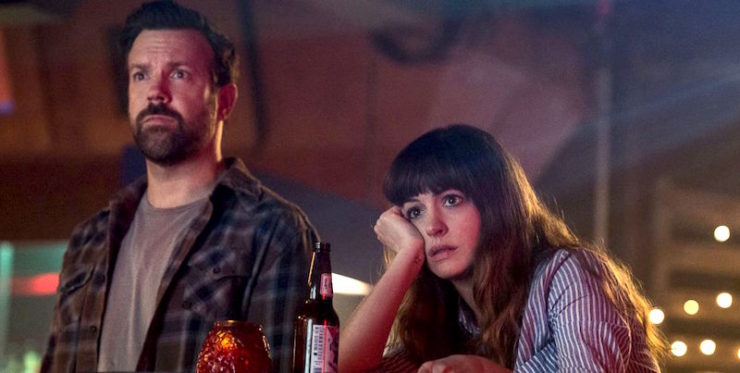Early on in Colossal, our protagonist Gloria (Anne Hathaway) is sitting in her friend Oscar’s bar with a couple of his pals. She finishes her anecdote, and Garth (Tim Blake Nelson) pipes up with those six magic words, “You know what your problem is?” He then proceeds to tell a story that is in no way related to Gloria at all.
And bless her grouchy, alcoholic heart, she stops him mid-sentence and says, “Sorry, what does this have to do with me?”
It may not really seem like a big deal, but these sorts of small jabs that point to bigger problems is precisely how Colossal builds itself up. It chugs along, picking up steam and gathering mass until is has the power of… well, a monster. A great big skyscraper-high monster.
Nacho Vigalondo’s Colossal packs a lot into a relatively bare framework, taking apart film genres, social issues, narrative conventions in one compact package. In order to properly address these various aspects, it’s best to review the story, then break the commentaries down one at a time. The first and most obvious of the film’s deconstructions comes from a complete shakedown of the romantic comedy genre, as Colossal proceeds to flip many of the genre’s most beloved conventions upside-down and leave them out to dry. So I’m going to start with those, and get gritty with several common elements of the rom-com, from multiple love interests to the awkward obsession the genre seems to have with quaint hometowns.
Next up will be a careful look at the kaiju movie genre that Colossal gets its monster from, as well as a peek into the background of the mecha (aka giant robot) narratives that permeate Japanese culture. By examining both of these together, it is easier to understand the relevance of melding a kaiju picture with a story that plays into romantic comedy tropes. These two disparate genres in concert, along with the examination of a couple ancillary themes regarding power and silence, helps to put the whole experience into perspective.

Colossal billed itself as a comedy in trailers, possibly a romantic one, with a side order of indie quirkiness. Gloria is kicked out of her boyfriend’s apartment due to her alcohol addiction, then heads back to her parents’ empty house in a town where they lived when she was a kid. She runs into Oscar and he gives her a job at his dad’s old bar—which he now owns and runs. He gets her some furniture, and she hangs out with him and his friends Joel (Austin Stowell) and Garth after closing each night. You can see where this is going, of course: city slicker ex-boyfriend is soon to be exchanged for old home pal who remembers all the reasons why Gloria is special and deserving of love. But that’s not what happens. Colossal sidles up to its rom-com tropes and then clobbers them with mallets and anvils, and it never really lets up. And to have Gloria played with such a superb uncomfortable immediacy by Anne Hathaway, a Hollywood darling who made her name on the cute sort of films that Colossal takes down? It seems like a deep-seated revenge of her own making, as though she willed Gloria into being by sheer determination and need. Here is how the rest of the story goes down….
The morning after Gloria’s arrival home, there are news reports that a monster is rampaging through Seoul. After a few days, Gloria notices that footage of the monster matches up with her own actions as she meanders through a nearby playground at a specific time each morning—she controls the monster. Gloria shows her new buddies her strange power when she’s drunk, and when she screws up and falls, Oscar rushes to help her. She wakes the next day in terror to find that she’s killed hundreds, and that Oscar can also show up in Seoul—as a giant robot.
Gloria stops drinking following her mistake, issues an apology in the playground sand for the city to see, and stops going there in the mornings. After she sleeps with Joel, Oscar goes back to the playground without her for the purpose of terrorizing Seoul with his robot avatar. Gloria gets him to leave the playground (and thus Seoul), but later at the bar Oscar gets drunk and tells her that he will go back the next morning unless she has a drink. She refuses, and Oscar sends Joel over with a van of furniture for Gloria in apology the next morning. Tim comes after Gloria, wondering why she won’t return his calls. Oscar decides to intimidate them both by setting off a gigantic firework in the bar—then he tells Tim that Gloria won’t go with him despite this display. When Gloria comes home that night, Oscar is waiting in her house, to make sure she won’t call Tim and try to leave with him.
Gloria has a flashback to the past and suddenly recalls the reason for their strange abilities: when they were children, she and Oscar were walking to school to turn in dioramas—his had a robot, hers a monster. A storm was sweeping the area, and her diorama flew out of her hands, which Oscar then went to retrieve. But when Gloria caught up to him, she found that he had located her diorama only to stomp it to pieces in a fit of rage. Both of them were then struck by lightning, connecting them to the action figures they had placed in their dioramas. Gloria snaps to and calls Tim, telling him she’ll leave with him, at which point Oscar heads back to the playground to make good on his threat. Gloria tries to stop him, but he beats her and crushes a section of Seoul while she lies helpless. When she returns home, inspiration strikes and Gloria boards a plane to Seoul, arriving there just as Oscar’s robot appears. Her presence on the other side of the globe leads her monster to appear on the playground with Oscar, and she picks him up and tosses him away. The robot disappears from Seoul, and Gloria goes to tell her story to a nearby bartender.
It’s a lot to pick apart, so let’s start with the more obvious dissection: All the rom-com tropes that plot just decimated. Here are just a few….
Choosing Between Two Guys
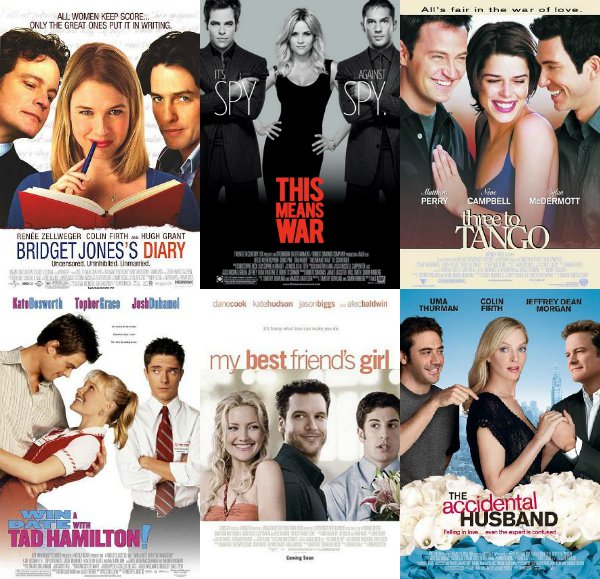
There are an obscene number of romantic comedies that turn on the premise of a woman stuck between two men—one who is obviously right for her, and one who she can’t seem to figure out is Mr. Wrong. Very often, the wrong guy stands for all things moneyed and urbane: he lives in the city, he wears good suits, he seems cultured and educated, he has a certain amount of wealth and/or status. He is played by Greg Kinnear for some reason. He turns out to be gay sometimes, or a cheating cad, or he’s a perfectly okay dude—but he’s not her Great Love. The man she’s meant to be with is often a more laid back specimen; he’s married to his five o’clock shadow, he doesn’t mind working with his hands, he is nerdy but in an “unpretentious” way, he drinks beer instead of wine and Manhattans. If it’s a teen romance, he definitely plays an instrument and has the floppiest hair. He’s there to pick up the pieces when her luck runs sour, or the other man breaks her heart.
In Colossal, Gloria has three clear romantic possibilities in front of her: Tim, her citified ex; Oscar, her hometown buddy; and Joel, who she just really wants to sleep with. Not only do we have a third option thrown into the mix, but none of these men turn out to be Gloria’s One and Only—in fact, none of them even approach that status, but they do buck the standard breakdown….
Ex-boyfriend Tim is excellent at making it look like he’s the evolved, caring one of the group, even if he takes up the Other Man spot in the roster. He goes on and on about Gloria’s (admittedly quite serious) drinking problem, about how he doesn’t want to see her do these things to herself—and if Tim had done his damnedest to take care of Gloria and had finally reached the end of his rope, that would be reasonable. But we never see any indication that he loves her at all, that he has actually tried to aid her beyond scolding and sanctimonious whining. When he comes to find her, it’s not because he’s frightened for her or feels remorse for how he treated her; we know that because if her safety and happiness were ever his priority, he would have never left her with Oscar after his firework escapade in the bar. Rather than call the police and stay until he was sure Gloria was safe, Tim skulks off after issuing his own ultimatum—that she must leave with him the next morning or else he’s gone. And when she calls him from Seoul, instead of expressing any kind of concern for her well-being, he tells her that he is owed an explanation for her actions. Tim’s abuse is subtle because it’s emotional; he withholds his affection as some sort of prize for good behavior while offering nothing when Gloria needs him.
Oscar, on the other hand, is set up to be the sensitive soul Gloria left behind, the man connected to home who needs recognizing. But any woman who has ever been catcalled or cursed at by an angry man is bound to notice something off about him from the start; he asks Gloria to hang out when he stumbles across her, but once she gets in the car and asks where they’re going, it takes him forever to respond… and then he admits that he’s taking her to work with him. Red flags continue to crop up when Gloria and Joel almost kiss on her first night hanging out at the bar, and Oscar threatens to kick his friends ass with no prompting; he talks about having a fiancee with a kid who left him because “the town was too small,” claiming no culpability whatsoever in the failed relationship; when Gloria is bereft at the thought of killing innocent people in Seoul after her first fall in the playground, he insists it’s not that bad by redirecting her to his appearance as a robot; when Garth and Joel are asking about Gloria’s career as a writer, Oscar talks about how they both wrote as kids, but her stuff always won the prizes because he sucked at it. Under the sweet guy facade is something far more sinister, something bitter and furious.
Then there’s Joel, but… well. We’ll get to Joel later.
Embracing the Hometown is the Only Way For A Female Protagonist to Grow
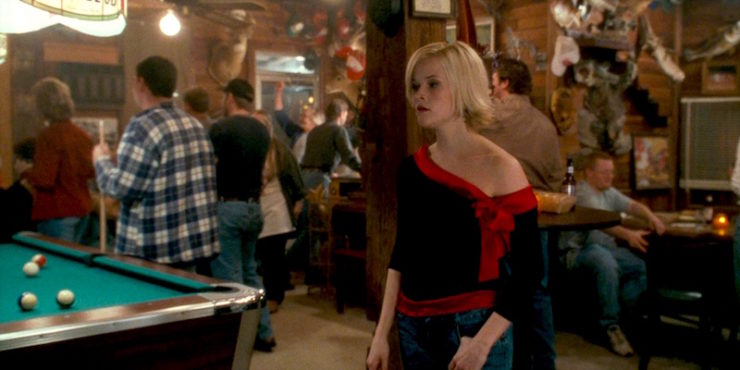
While men on film are gifted with a starling array of character arcs to choose from, women in romantic comedies tend to get cornered with a very specific one: the journey of finding oneself by reconnecting with home or family roots. Especially if that home happens to be a rustic underpopulated town with colorful locals. Especially if she used to love some boy back there when she was a kid. In Home for the Holidays, Holly Hunter is only capable of finding a nice boyfriend because she heads to her parents for Thanksgiving and gets set up by her brother, who brings a friend along to dinner. Diane Keaton finds love, entrepreneurial success, and a newfound satisfaction in motherhood after quitting her high-powered New York job and moving to the country in Baby Boom. Peggy Sue Got Married is all about the eponymous central character reconciling a seemingly failed marriage by going to her high school reunion, then being transported back in time so that she can relive her final days of school and rediscover how much she loves her cheating husband. (For real.) And on and on it goes….
But Gloria’s return home isn’t really about growth so much as it is about coming to terms with her demons, both metaphorical and literal. While she must return to the sleepy town in order to learn about her strange ability, it is not her true home, nor is it a place where she can recall simpler, happier times. The town is also not there to serve as a reminder of the “little girl” lost inside her that she needs to reconnect with. Rather, it is the site of the first time that Gloria was diminished in favor of a man’s ego—Oscar’s destruction of her school project. This seems to be something of a pattern in her life, if the relationship with Tim is anything to go by, and recognizing the root of such a pattern is essential in helping her change for the better.
Even if Gloria really likes the gimmicky old cowboy half of Oscar’s bar, it has nothing to do with her need to put down roots or get in touch with a simpler, “truer” version of herself. She’s just there to put some pieces into perspective.
Nice Guys Finish Last

Despite recent takedowns of the “Nice Guy” myth from Severus Snape to Ross Geller, romantic comedies are still bursting with awkward, supposedly sensitive dudes who “deserve” a chance from the object of their affections. Sometimes this guy patiently waits, hoping that the girl of his dreams will notice that he’s been boom boxing outside her window for years—just very quietly and unobtrusively because that’s the respectful way to do it. Sometimes he gets tired of how she doesn’t pick up on his signals, and abandons her when she needs him most—leading to tearful confessions and apologies. There’s also the possibility that he manipulates the situation via money or newfound mojo in order to direct the apple of his eye into his waiting arms. It’s not creepy! It’s true love, and we must attain it by any means necessary, including things that would normally get us thrown in prison.
Oscar is Mr. Nice Guy. Our rather, we expect him to be the Nice Guy because the film is deliberately toying with the audience’s expectations. But the truth about him comes more clear as the movie picks up speed; Oscar punishes Gloria—both for sleeping with Joel and for insisting on making her apology to the people of Seoul alone, without him—by frightening random people on the other side of the world. He later blames it on being drunk, and sends Joel over to apologize on his behalf. When Gloria confronts Oscar at his house, the place is a wreck and she can see a picture of his ex-fiancee with her face scratched out still on display. Oscar tells Gloria that he wants her to drink with him after she’s stopped because he “knows [she] wants it.” He tells her that he won’t stop appearing on the playground because he’s finally special, just like her. Gloria figures it out in the end: Oscar isn’t doing all of these things because he wants her—he’s doing it because he hates himself and his life.
This distinction is an important one that often goes unexplored where conversations about misogyny in popular entertainment are concerned; sexism rooted in feelings of inadequacy. The unspoken rules of patriarchy and toxic masculinity dictate that worthwhile men are entitled to certain things—power, wealth, sex, assurances of their own importance. If a man does not have these things, anger is a common response to being denied what is “rightfully” owed. Rather than direct that anger toward the systems that made them feel that way in the first place, or addressing their own shortcomings to improve their situation, they often direct it toward women and anyone else that they believe is owed less according to social hierarchy (people with disabilities, people of color, queer people, etc.). In Oscar’s case, Gloria’s successes are insulting because he believes that she is less deserving of them than he is, and wants to blame his lack on her seeming abundance. Even when he’s defeated, he can’t stop himself from one last pathetic jab—he begs the monster to release him before finally shouting “Put me down, you fucking bitch!” He cannot stomach the idea of giving up a newfound dominance that he has always believed was owed to him.
Then there’s Joel, who seems like he should be the Hidden Nice Guy, the one who’s there to make up for Oscar’s fake-out. But his complicity in all this is actually more damaging—and what’s worse is how common it is. Everyone knows a Joel or two, or five, or a dozen. He’s the guy who is so cowardly (or so proud of himself for never “making waves”) that he refuses to call his friends out, contributing to the abuse of others by default. When Oscar’s behavior takes a nosedive, Joel does nothing to head him off. He doesn’t try to stop his friend from drinking, he doesn’t stand up to Oscar when he gets mean, he doesn’t make any move to take Gloria’s side in the fallout. After pissing off his buddy by having consensual sex, Joel is the one who delivers a truck full of furniture and Oscar’s apology to Gloria. Keep in mind, what Oscar has done is monstrous; he is punishing Gloria for having sexual agency, endangering the lives of thousands of people for revenge, and verbally and emotionally abusing everyone close to him.
But Joel never says that enough is enough. He doesn’t ask Gloria if she wants his help. He doesn’t join forces with Garth, the only person who even attempts to stand up for her (and is then swiftly, brutally shut down by Oscar for trying to defuse the situation). He just sits by and lets it all happen. He believes Oscar’s apology to Gloria is genuine enough to deliver it, despite the fact that Oscar’s actions do not warrant any brand of understanding or forgiveness. And by refusing to condemn those actions, he makes it even more likely that Gloria will accept Oscar’s apology at face value—you don’t really have a choice when no one else will have your back against a guy who is willing to murder countless innocents to put you in your place. Don’t forget, this has probably already happened before in this small circle of friends; Oscar’s openly abusive displays practically guarantee that he mistreated his former fiancee as well (abusers have cycles that they perpetuate on anyone who they can exert power over), and if Joel was around back then, he’s already made these sorts of excuses and apologies for his friend before. Joel’s inclusion in Colossal might seem benign, but he’s precisely the opposite. He is an indictment of apathy in the face of misogyny.
Women Who Are Too Success-Driven/Wild Need to Be Saved
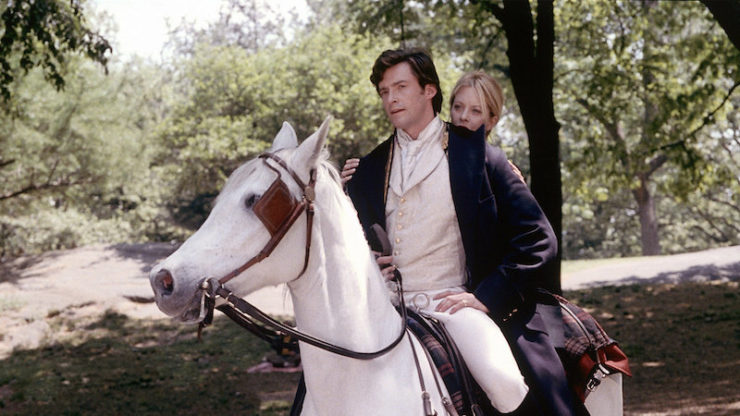
As the world chugged along and modernized, women started worrying about “having it all,” a tepid phrase that is shoved at any female person who dares to admit that balancing a career with a family is incredibly hard work. But with that came a subtle pushback, stories about the price of living your dream. If you care too much about work, how will you ever be loved? Guys don’t like women who enjoy what they’re doing with their life—don’t you know that business makes you cold and calculating and merciless and that’s their job? Get a grip, ladies. You’ll be happier if you let go of your larger responsibilities and interests—love is way more interesting than things that already interest you.
And if you’re a party girl? Oof. Someone’s gotta help you clean up your act. And you deserve to be punished for it, by the way. Because drinking, and running away, and making questionable choices are things that only make guys cute. Drunkenly singing Guns’N’Roses on top of a table on graduation night is adorable when you’re a dweeb who is coming out of his shell—but if you’re a lady, you’ll probably only be remembered for falling off the table, vomiting on the floor, and ripping the zipper of your minidress.
Let’s be clear here: Gloria has a problem, and it’s a big one. It’s also a real one that can’t be helped by the love of a pretty guy, or time spent with her mom and zany aunts, or the magical curative of a town festival with prophetic carnival games. Gloria is an alcoholic. It’s not a glamorous condition, it’s not cute and funky and easily accessible for every kid who got “messed up” at a party once. There are consequences to this problem, and because this is a science-fictional yarn, those consequences are devastating and magnified—a single stumble leads her to kill hundreds of people who she has never even met. And while there is no way for her to make up for the magnitude of that bad decision, she takes it upon herself to prevent any relapse from occurring. She does so without anyone else’s help or input because the only person who can fix her train wreck is the person driving the train.
Gloria makes it her first task to apologize to the people of Seoul, and in doing so, contextualizes the terror these people have witnessed so that they can begin to recover. But even as she undertakes the steps necessary to clean up her act, Oscar pushes against her progress, constantly encouraging her to drink and eventually threatening her to that end. Rather than being “fixed” by some swell guy in her life, Gloria has one actively thwarting her efforts. She manages in spite of this by slowly gaining the confidence necessary to fight back. In having Gloria take responsibility for her actions, Colossal posits the revolutionary (for Hollywood) suggestion that a woman can be her own teacher and savior. That a woman can be enough for herself, and that learning this lesson in the world we occupy might be the hardest task of all.
And what of the kaiju metaphor? you might say. Where does that fit in to all this? Seems like a pretty important element to just be hanging out in this movie doing nothing in particular.
So glad you asked….
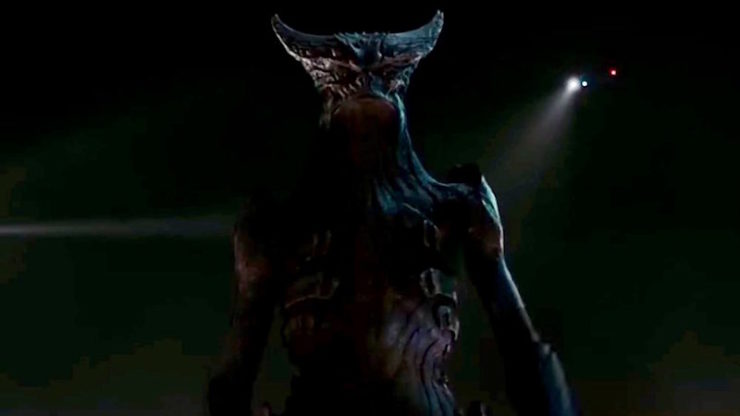
See, the monster isn’t simply an avatar for Gloria to work through—the monster is Gloria. Specifically, the monster is a manifestation of her might and protective instinct (of herself and others). The monster was born of Gloria’s need to fight back against a boy who had taken something from her because he thought it was his right. Oscar believed, even as a child, that he had the right to diminish her due to his own feelings of worthlessness, and Gloria’s response was to develop a way to resist that abuse rather than succumb to it. Her trip to Seoul is important because by being there she won’t hurt anyone South Korea, but there’s another aspect to that journey; by seeing the monster, Oscar is finally forced to come to terms with the power that Gloria possesses. He is forced to see her, truly, for the first time.
But why kaiju? Aside from the “metaphor for nuclear weaponry post-WWII” angle that often crops up, one of the more popular takes in film criticism is that the kaiju were used to symbolically work through rapid changes in Japanese culture; humanity in general, and the Japanese in particular, faced a quick succession of new challenges the 20th century, and giant monsters—who were eventually written with more specific backstories and motivations behind their citywide attacks—were a helpful way of working through the constant shifts in the status quo. The kaiju often represented, or reacted to, various noxious human systems and behaviors: corporate greed, pollution of the earth, unending hubris in the face of nature and its forces. In fact, one of the most ready readings of the kaiju is that they are a literal embodiment of nature’s wrath; par for the course in a country that regularly experiences earthquakes and tsunamis. Gloria gets her own chance to embody this wrath for similar reasons; she is standing in opposition to an injustice acted out against her, and like a natural disaster, she isn’t initially aware that she is causing harm.
On the flip side of this is Oscar’s robot avatar. As represented in various media, mecha are typically piloted by people, and there would likely be an assumption—especially by South Korean onlookers—that Oscar’s robot was controlled by someone, a person, who wished them ill. But mecha are not generally considered to be engines of destruction in Japanese stories—in fact, they may represent something far more meaningful. Barder, a game designer who writes the Mecha Damashii blog said in an interview with Kotaku in 2011:
“What with the dissolution of the samurai during the Meiji Restoration, mecha were partly birthed from that cultural vacuum. I think this is also why for Japanese mecha they are often ciphers for the human pilots, like armor, and a means to help them attain a form of spiritual redemption.”
Barder then goes on to suggest that there is an element of bushido tied to mecha in Japan; bushido is the samurai code, focused on honorable conduct, wisdom, and loyalty. This can be observed in many stories featuring mecha. A team of defenders may merge their separate vehicles into one super-mecha (as in Voltron) to fight a villain, showing loyalty to one another and respect for their comrades. Even solo mecha may work in teams (such as those in Neon Genesis Evangelion) to protect others against a terrifying foe. Which means that Oscar’s use of the giant robot goes beyond the obvious cruelty—it is also a flagrant misuse of mecha and what they are meant to represent. He does not act with honor, with any sort of mastery, with courage or regard for others. He has taken a symbol that is associated with teamwork and protection and virtue, and turned it into a big, blunt hammer of his own pitiful emotions to be wielded against anyone who won’t give him his way.
With that in mind, it is hardly shocking that the people who observe the fights between Gloria and Oscar via footage from Seoul take a clear side in this fight: Gloria’s. In the bar, in homes nearby, on the news channels, the people have picked their hero, and it’s not the giant potentially-human-piloted robot. From a meta standpoint, that’s a fascinating deconstruction of the typical kaiju-mecha fight and the potential allegories beneath it. There’s another potent reading to be had if we buy into the idea that Gloria’s monster is meant to stand against what kaiju often stand against: toxic human systems and behaviors. In this case, it isn’t greed or hubris or environmental destruction that she’s battling—it’s systemic sexism and female oppression. Either way, a monster was precisely what this movie needed.
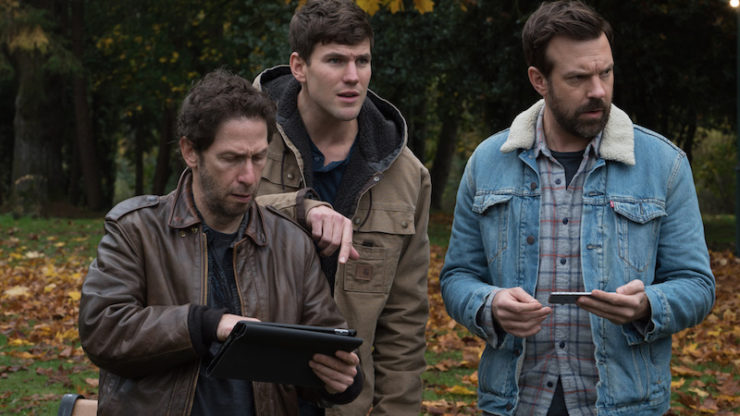
Colossal is also a story that is deeply concerned with the ways in which women are silenced and intimidated in all corners of life. Oscar often manages this with nothing but his presence, keeping himself in Gloria’s orbit so that she doesn’t feel comfortable speaking or acting candidly. His choice to scratch his ex-fiancee out of his pictures is a way of denying her existence to anyone who happens upon the images, silencing her through erasure even if her absence is notable. Tim silences Gloria by continually putting her down, by refusing to let her get a word in every time he asks her a question and grouses about her habits. Gloria used to write on the internet, and she lost her job because of an unspecified attack by commenters that caused her to be viewed unfavorably by her publication—in a post-Gamergate world, this particular form of silencing is more common than ever for women.
But in another sharp twist, the most potent and stunning silence in Colossal is not directed at a woman. When Gloria and Oscar tussle on the playground, they can hear people nearby at home watching Seoul on television, cheering every time that Gloria’s monster tells Oscar’s megabot what for. But when Oscar makes the choice to lay into Gloria, to beat her until she cannot stand, he straightens up in expectation—and there’s nothing. The block is dead quiet. No laurels for Oscar’s brutality, no praise for his violence. The film rejects the premise that intimidation grants anyone true power.
Colossal is a entire story built on playing people’s expectations; it pretends to be a romantic comedy, it works within the confines of a kaiju monster smackdown, it pulls elements from thrillers and feel-good dramas. While this has led some critics to call the film sloppy, I would argue the opposite; the film works in these abrupt shifts on purpose to keep its audience feeling awkward and out of place. They are meant to get their own dose of Gloria’s discomfiture by swallowing these sharp turns in tone, cues, and pacing. Because her victory isn’t really about “saving the world”—she ultimately does help the people of Seoul because she isn’t going to stand by and let one guy threaten them for fun, but she’s not doing it to feel like a big hero. She’s doing it because she has to. Because the only other option is permitting one awful man to control her entire life. And she’s too stubborn and too smart and too pissed off to allow that.
And if that’s not a heroic choice for any woman to make in this day and age, then I don’t know what is.

Emmet Asher-Perrin is also a great big monster somewhere on the inside. You can bug her on Twitter and Tumblr, and read more of her work here and elsewhere.










